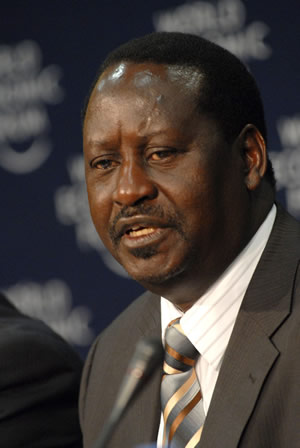
On October 9, former Prime Minister of Kenya Raila Odinga joined the MacMillan Center before a packed Luce Hall auditorium. Prime Minister Odinga was the honored guest for the annual Coca-Cola World Fund at Yale Lecture, speaking on the topic of “Afro-Optimism: Has the Pendulum Swung Too Far?”
Prior to his term as Kenya’s prime minister from 2008-2013, Odinga served in the nation’s parliament for over decade, and was also both Kenya’s Minister of Energy and Minister of Roads, Public Works, and Housing.
Beyond simply “Afro-optimism,” Prime Minister Odinga’s lecture centered on “Afro-empowerment.” He noted, “Until Africans can tell their story, the African story will be told by others. These will be the stories of military coups, malaria, HIV/AIDS, and ethnic conflict.”
It is true, Prime Minister Odinga commented, Africa is not without its fair share of challenges. Only one out of four Africans has access to electricity. Millions of women and children die every year from preventable diseases; unemployment continues to threaten stability; and the continent is a net importer of food.
However, Africa’s emergence as an economic force is no longer an expression of hope. It is a fact. “Hope is everywhere,” the Prime Minister observed, “and I am an Afro-Optimist.”
Prime Minister Odinga reflected upon the continent’s rapid transformation. “Change is taking place at a dizzying pace,” he commented. Six out of ten of the world’s fastest growing economies are in Africa. Life expectancy has increased by ten percent; child mortality is falling in most countries; real income per person has increased by more than thirty percent; and over the next decade, Africa’s GDP is expected to rise six percent per year. Perhaps most shockingly, Africa’s population is projected to quadruple to 4.2 billion this century, whereby forty percent of all humans will be African.
With seventy percent of all Africans under the age of thirty, Prime Minister Odinga offered a glimpse into the future of Africa. In order to ensure a strong and prosperous future for the continent, Odinga asserted that Africans must push for freer societies, increased access to education, economic reform, and greater freedom of the press.
“Problems arise when the youth are not empowered, and empowerment comes through education.”
Odinga addressed “the elephant in the room: China.” He noted, “China is not in Africa to develop the continent but rather for its own strategic interests.” In reflecting upon U.S.-African relations, Odinga said that he hopes “this relationship will be mutually beneficial and not simply a scramble for resources.”
Combating the drain of resources has long been a challenge for the African continent. “Systemic corruption,” Odinga noted, “must be confronted, as it diverts resources from the public coffers to private hands.” Africa loses $148 billion a year because of corruption, which is also responsible for the increase in cost of goods by over twenty percent. Though a lot of progress has been made in battling corruption, still much work needs to be done.
With challenges abound, Odinga – the quintessential “Afro-Optimist” – looked on with confidence at the African century ahead.
“The Asian tiger has danced alone on the international stage for far too long,” Odinga concluded. “Long ago the European bear retreated and the American bison has run to the ocean, but the African lion is now awake, and soon it will be strong enough to dance on the stage alongside the Asian tiger.”
